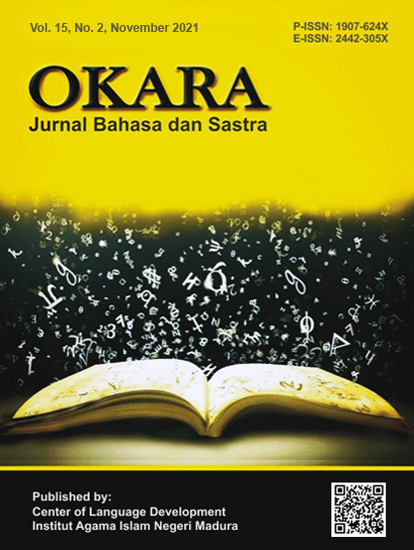Westernization and Colonization of the Mind in Chinua Achebe’s “Dead Men’s Path”
 Abstract views: 3186
,
Abstract views: 3186
,
 PDF downloads: 1786
PDF downloads: 1786
Abstract
British occupation in Nigeria has brought several impacts to the native land and also the indigenous people. Westernization and colonization of the mind are two inseparable effects of colonialism. These two issues are oftentimes depicted in literary works focusing on colonialism as their theme. The aim of this study is to analyze the issues of westernization and colonization of the mind raised in Chinua Achebe's "Dead Men's Path." The data were taken from quotes that prove the existence of these issues from a short story entitled “Dead Men’s Path” by Chinua Achebe and analyzed them using Homi Bhabha’s theory of mimicry and Ngũgĩ wa Thiong’o’s theory of colonization of the mind. The results showed that westernization and colonization of the mind have affected Michael Obi, the main character in the story. Westernization influences Obi to adopt modern life and Western thoughts that show the process of mimicry, while colonization of the mind makes Obi downgrades Nigerian cultures. The issue of the management of land was also found in the story as a continuation of the previous problems. “Dead Men’s Path” by Chinua Achebe reveals that British colonialism has changed the perspectives of Nigerian elites, as seen in Michael Obi’s story.
Downloads
References
Achebe, Chinua. “Dead Men’s Path.” In Girls at War and Other Stories. New York: Anchor Books, 1973.
Bala, Umaru Abubakar. “Colonialism and the Development in Nigeria: Effects and Challenges.” International Affairs and Global Strategy 70 (2019): 9–20.
Bhabha, Homi K. The Location of Culture. London: Routledge, 1994.
Casimir, Komenan. “Promotion of Igbo Culture in Chinua Achebe’s Girls at War and Other Stories.” Global Journal of Arts, Humanities and Social Sciences 6, no. 9 (2018): 26–41.
Duke II, Joe. “The Impact of Colonialism on the Development of Management in Nigeria.” International Journal of Business and Management 5, no. 8 (2010): 65–75. https://doi.org/10.5539/ijbm.v5n8p65.
Garuba, Harry. “Chinua Achebe and the Struggle for Discursive Authority in the Postcolonial World.” PMLA 129, no. 2 (2014): 246–48. https://www.jstor.org/stable/24769453.
Nensilianti, Sy. Fatma Al-Khiyyed, and Hasvivi Tri Anjarsari Fahrir. “Colonial Racial Ethnocentrism Towards Indigenous People in a Short Story Collection ‘Semua Untuk Hindia’ by Iksaka Banu (A Postcolonial Study).” OKARA: Jurnal Bahasa dan Sastra 15, no. 1 (2021): 1–21. https://doi.org/10.19105/ojbs.v15i1.3982.
Nwinya, Stephen Chijioke. “The Conflate of Modernization and Westernization and Africa’s Quest for Authentic Civilization and Development.” IOSR Journal of Humanities and Social Science 24, no. 10 (2019): 59–65.
Ocheni, Stephen, and Basil C. Nwankwo. “Analysis of Colonialism and Its Impact in Africa.” Cross-Cultural Communication 8, no. 3 (2012): 46–54. https://doi.org/10.3968/j.ccc.1923670020120803.1189.
Overbey, Karen Eileen. “Postcolonial.” Studies in Iconography 33 (2012): 145–56. https://www.jstor.org/stable/23924279.
Prianti, Desi Dwi. “Towards the Westernized Body: A Popular Narrative Reinforced by Men’s Lifestyle Magazines in Indonesia.” Inter-Asia Cultural Studies 19, no. 1 (2018): 103–16. https://doi.org/10.1080/14649373.2018.1422351.
Putri, Liza, and Katherine Clayton. “The Identity Issue of the Colonized and the Colonizer in Cloud Nine by Caryl Churchill.” International Journal of Cultural and Art Studies 4, no. 1 (2020): 1–8. https://doi.org/10.32734/ijcas.v4i1.3620.
Ress, David. Deeds, Titles, and Changing Concepts of Land Rights: Colonial Innovations and Their Impact on Social Thought. London: Palgrave Macmillan, 2020.
Said, Edward. Culture and Imperialism. New York: Vintage, 1994.
Sairin, Sjafri. “Modernization and Westernization: A Never-Ending Discourse in Indonesia.” Journal of Governance and Development 7 (2011): 1–7.
Seth, Sanjay. “Postcolonial Theory and the Critique of International Relations.” Millennium 40, no. 1 (2011): 167–83. https://doi.org/10.1177/0305829811412325.
Sibani, Clifford Meesua. “Impact of Western Culture on Traditional African Society: Problems and Prospects.” International Journal of Religion and Human Relations 10, no. 1 (2018): 56–72.
Souad, Merah, and Tahraoui Ramdane. “Learning English in the 21st Century: For Globalization or Westernization?” International Journal of Humanities and Social Science 9, no. 6 (2019): 165–72. https://doi.org/10.30845/ijhss.v9n6p20.
Spivak, Gayatri Chakravorty. “Can the Subaltern Speak?” In Marxism and the Interpretation of Culture, edited by Cary Nelson and Lawrence Grossberg. Urbana: University of Illinois Press, 1988.
Steinmetz, George. “The Sociology of Empires, Colonies, and Postcolonialism.” Annual Review of Sociology 40, no. 1 (2014): 77–103. https://doi.org/10.1146/annurev-soc-071913-043131.
Sulistyaningsih, Sulistyaningsih, and Dina Merris Maya Sari. “The Ideological Reflection in F. Scott Fitzgerald’s Novel, The Great Gatsby, (Post-Colonial Literature).” ATAVISME 21, no. 1 (2018): 121–32. https://doi.org/10.24257/atavisme.v21i1.439.121-132.
The Editors of Encyclopaedia Brittanica. “Chinua Achebe: Nigerian Author.” In Encyclopedia Britannica. Accessed October 25, 2021. https://www.britannica.com/biography/Chinua-Achebe.
Thiong’o, Ngũgĩ wa. Decolonising the Mind: The Politics of Language in African Literature. London: Library of Congress Cataloging in Publication Data, 1986.
Uysal, Nuriye Degirmenci. “Teaching English to Very Young Learners.” Procedia - Social and Behavioral Sciences 197, no. 2 (2015): 19–22. https://doi.org/10.1016/j.sbspro.2015.07.042.
Young, Robert JC. “Postcolonial Remains.” New Literary History 43, no. 1 (2012): 19–42. https://doi.org/10.1353/nlh.2012.0009.
The journal operates an Open Access policy under a Creative Commons Attribution-NonCommercial 4.0 International License. Authors who publish with this journal agree to the following terms:
- Authors retain copyright and grant the journal right of first publication with the work simultaneously licensed under a Creative Commons Attribution License that allows others to share the work with an acknowledgement of the work's authorship and initial publication in this journal.
- Authors are able to enter into separate, additional contractual arrangements for the non-exclusive distribution of the journal's published version of the work (e.g., post it to an institutional repository or publish it in a book), with an acknowledgement of its initial publication in this journal.
- Authors are permitted and encouraged to post their work online (e.g., in institutional repositories or on their website) prior to and during the submission process, as it can lead to productive exchanges, as well as earlier and greater citation of published work.





_(1).png)
.png)
.png)
1.png)
.png)
.png)

.png)
_-_Copy_-_Copy.png)





